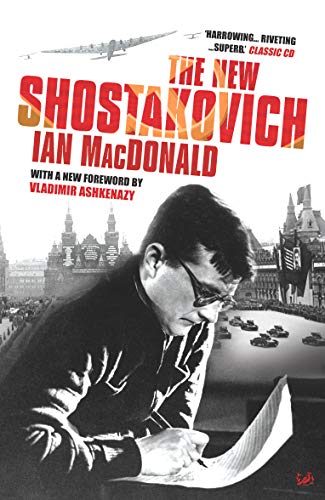May. 11th, 2020
Ian MacDonald "The New Shostakovich" (Pimlico)

Dmitri Shostakovich died in 1975 but already the myth of the composer as a loyal supporter of Communism and the Soviet state has been effectively scuppered not least by Shostakovich himself in his controversial memoir, Testimony. The authenticity of that book has been disputed, but, as Ian MacDonald reports in the opening chapter of his biography, its essential truthfulness is now widely accepted.
MacDonald is the first writer to really test that truth against evidence of the music and, if The New Shostakovich is the most conventional of these books in form - a chronological narrative of the man and his works - in content, it is the most revelatory. The backbone of the book is MacDonald's "decoding" of many of Shostakovich's major works to reveal a secret, dissident history of Russia through the nightmare decades of Stalinist dictatorship. It 's a gripping, often horrifying, story and MacDonald astutely marches the politics to the music, making you re-listen and re-think your responses to the latter with discomfiting regularity. I'm not sure I'd agree with every detail of his interpretations, but the main thrust of his argument and most of his conclusions are indisputable. A magnificent reappraisal of one of the last century's greatest and, it seems, most misunderstood artists.

Dmitri Shostakovich died in 1975 but already the myth of the composer as a loyal supporter of Communism and the Soviet state has been effectively scuppered not least by Shostakovich himself in his controversial memoir, Testimony. The authenticity of that book has been disputed, but, as Ian MacDonald reports in the opening chapter of his biography, its essential truthfulness is now widely accepted.
MacDonald is the first writer to really test that truth against evidence of the music and, if The New Shostakovich is the most conventional of these books in form - a chronological narrative of the man and his works - in content, it is the most revelatory. The backbone of the book is MacDonald's "decoding" of many of Shostakovich's major works to reveal a secret, dissident history of Russia through the nightmare decades of Stalinist dictatorship. It 's a gripping, often horrifying, story and MacDonald astutely marches the politics to the music, making you re-listen and re-think your responses to the latter with discomfiting regularity. I'm not sure I'd agree with every detail of his interpretations, but the main thrust of his argument and most of his conclusions are indisputable. A magnificent reappraisal of one of the last century's greatest and, it seems, most misunderstood artists.
Ian MacDonald "The New Shostakovich" (Pimlico)

Dmitri Shostakovich died in 1975 but already the myth of the composer as a loyal supporter of Communism and the Soviet state has been effectively scuppered not least by Shostakovich himself in his controversial memoir, Testimony. The authenticity of that book has been disputed, but, as Ian MacDonald reports in the opening chapter of his biography, its essential truthfulness is now widely accepted.
MacDonald is the first writer to really test that truth against evidence of the music and, if The New Shostakovich is the most conventional of these books in form - a chronological narrative of the man and his works - in content, it is the most revelatory. The backbone of the book is MacDonald's "decoding" of many of Shostakovich's major works to reveal a secret, dissident history of Russia through the nightmare decades of Stalinist dictatorship. It 's a gripping, often horrifying, story and MacDonald astutely marches the politics to the music, making you re-listen and re-think your responses to the latter with discomfiting regularity. I'm not sure I'd agree with every detail of his interpretations, but the main thrust of his argument and most of his conclusions are indisputable. A magnificent reappraisal of one of the last century's greatest and, it seems, most misunderstood artists.

Dmitri Shostakovich died in 1975 but already the myth of the composer as a loyal supporter of Communism and the Soviet state has been effectively scuppered not least by Shostakovich himself in his controversial memoir, Testimony. The authenticity of that book has been disputed, but, as Ian MacDonald reports in the opening chapter of his biography, its essential truthfulness is now widely accepted.
MacDonald is the first writer to really test that truth against evidence of the music and, if The New Shostakovich is the most conventional of these books in form - a chronological narrative of the man and his works - in content, it is the most revelatory. The backbone of the book is MacDonald's "decoding" of many of Shostakovich's major works to reveal a secret, dissident history of Russia through the nightmare decades of Stalinist dictatorship. It 's a gripping, often horrifying, story and MacDonald astutely marches the politics to the music, making you re-listen and re-think your responses to the latter with discomfiting regularity. I'm not sure I'd agree with every detail of his interpretations, but the main thrust of his argument and most of his conclusions are indisputable. A magnificent reappraisal of one of the last century's greatest and, it seems, most misunderstood artists.
So It's Monday.
May. 11th, 2020 05:56 pmWell, what a blustery day it has been with a bitterly cold northeastern wind swirling around reaching the forties speed-wise. Hopefully, tomorrow will be warmer and less windy.
I have been reading and listening to some music as well as packing four items to post off tomorrow - three sales from eBay and one from Discogs.
Later tonight I will be watching some more AoS and Supergirl.
Not much else to report.
I have been reading and listening to some music as well as packing four items to post off tomorrow - three sales from eBay and one from Discogs.
Later tonight I will be watching some more AoS and Supergirl.
Not much else to report.

